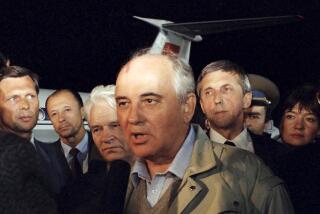Cheney Predicts Gorbachev Will Fail, Be Ousted
WASHINGTON â Defense Secretary Dick Cheney, in a striking departure from official U.S. policy, predicted Friday that Soviet President Mikhail S. Gorbachev will fail in his reform efforts and be replaced by a hard-liner who will be âfar more hostileâ to the West.
The Pentagon chief said Gorbachev faces an entrenched, conservative Soviet bureaucracy that ultimately will thwart his policies and drive him from office.
âMy personal view is that the task that he set for himself of trying to fundamentally reform the Soviet system is incapable of occurring,â Cheney said in an interview taped Friday and to be aired today on CNNâs âEvans & Novakâ program.
âFar More Hostileâ
âIf I had to guess today, I would guess that he would ultimately fail,â Cheney said. âThat is to say that he will not be able to reform the Soviet economy to turn it into an efficient, modern society. And that when that happens, heâs likely to be replaced by somebody who will be far more hostile than heâs been in terms of his attitude towards the West.â
Official Administration policy is that Gorbachev is firmly in control of the Soviet government despite some internal opposition and will continue to be the nationâs leader for the foreseeable future.
Gorbachevâs purge of 110 members of the policy-making Central Committee and the Central Auditing Commission this week was interpreted by American analysts as further evidence of his consolidating power by removing hard-line elements in the Soviet bureaucracy.
No senior U.S. official had predicted publicly that Gorbachev would be forced from office by conservative opponents.
A Cheney aide explained that the defense secretaryâs comments were âpersonal opinionsâ and not U.S. government policy. The State Department referred questions on the incident to the Pentagon, where a spokesman said that Cheneyâs responses were âguesswork, not a considered statement of policy.â
âItâs not inconsistent with what Cheney has been saying,â chief Pentagon spokesman Dan Howard said. âHe was asked his personal opinion. This is not a completely unfounded notion. Itâs a guess based on 70 years of experience with Soviet leadership and the almost intractable economic problems and the intransigent bureaucracy Mr. Gorbachev has to deal with.â
Cheney used the prediction to justify his position that U.S. troop levels in Europe should not be cut in response to promised reductions in Soviet military forces.
âI think that would be a big mistake,â he said. âI think it would undo basic commitments to the (Western) alliance, and until we know that Gorbachev is for real and that the changes he wants to bring about are irreversible, itâd be a terrible mistake for us to withdraw from Europe.â
He said, however, that he believes that the Western European nations should pay a greater share of the costs of defending Europe.
âWeâve got to work to try to get the Europeans to do more,â he said.
On a related matter, Cheney said that a widening German-American rift over whether to negotiate the removal of short-range nuclear weapons from West Germany might not be resolved by the time of the North Atlantic Treaty Organization summit conference at the end of May.
âWeâve been through this kind of thing before . . .,â Cheney said. âClearly the political situation in Germany today is a delicate one from (West German Chancellor Helmut) Kohlâs standpoint. Will it be resolved before the NATO summit? I donât know. It may be. On the other hand, it may not get resolved for a while.â
More to Read
Sign up for Essential California
The most important California stories and recommendations in your inbox every morning.
You may occasionally receive promotional content from the Los Angeles Times.









